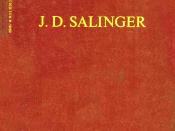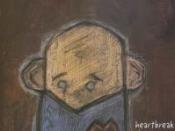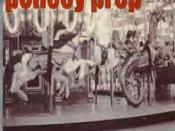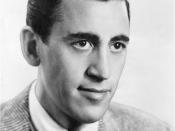J.D. Salinger's "The Catcher in the Rye" is a great example of how teenagers' minds work. Teens are just establishing their ideas on the world around them. Many get the idea that their surroundings are "phony." Holden Caulfield thinks everyone and everything is phony in one way or another. He is "surrounded by phoniness because that is the word he uses to identify everything in the world that he rejects" (www.bookrags.com).
Holden is one of the most substandard people that a person could present. He is very far from being perfect, however, he would never admit that to himself or to anyone else. He often judges people on how they act and things they say. He doesn't give them a chance to really show their personality. Salinger mentions many instances where he demonstrates this through Holden's recollections of the events that occurred during the three days in which the story takes place.
Holden mentions how many people are hypocrites and they live their lives contradictory to what they say. It is very ironic that he says this because he does the very same thing when he meets Ernest Morrow's mother on the train to New York City. He tells her that his name is "Rudolf Schmidt" (Salinger, 54), who is actually the custodian at Pencey Prep. Also, he tells her a lot of good things about the woman's son, which is far from the truth. Finally, before departing the train at her destination, Holden tells Mrs. Morrow that he is going home early from Pencey Prep because he has to "have this operation" (Salinger, 58) to remove "this tiny little tumor in the brain" (Salinger, 58). Although he feels bad about lying to Mrs. Morrow, he keeps doing it until she had departed from the train. It seems as though he is a pathological liar, which really stands out in the idea that he sees everyone and everything around him as phony, except himself.
Holden Caulfield is, what most people would call, demented. He sorts through life piece by piece finding things wrong with every part. Any situation that arose in Holden's life, or anyone else's, he found something to be wrong. While in New York City, Holden went to see a movie to try to kill a little bit of time before his date with Sally Hayes. "One of Holden's big pet peeves" (Dush, www.bookrags.com) is movie actors and actresses. These actors present "fake emotions and stereotyped roles" (Dush, www.bookrags.com). To show his harsh judgement of people, take a look at how he sees his older brother D.B. Caulfield . He refers to D.B. has a "Hollywood....prostitute" (Salinger, 2). In actuality, D.B. is a successful movie script writer in Hollywood. Holden sees him as a phony, probably, because D.B. has not had many of the psychological, social, relationship, and family problems that he has had to go through in his short 16 years of life. Holden tends to look down on people who have the kind of life that he wishes he could experience. However, there is one person that he really cares about who has not had a chance to experience things he wishes he experienced and that was his 10-year old sister Phoebe. Phoebe is his favorite person who is still living. She is one person that he finds no phoniness in, whatsoever. He really looks up to her in a weird sort of way. He is fascinated by the innocence of younger people because their innocence is what has kept them from experiencing things that make them appear as a phony and he longs to have his innocence back.
By the end of the story, Salinger has built up the reader to believe that all Holden is about is judgment. However, he throws in a twist. Throughout the whole story, the reader sees this as a present occurrence in Holden's life but it is merely a flashback. He is actually in a mental institution and telling the doctors about how he got out of Pencey Prep and what he did after he got out. Salinger expresses at the end of the story that Holden "sort of miss[es] everyone" (214) that he has criticized and called hypocrites. He misses the people he hated with a passion from Pencey Prep, people he had short encounters with while in New York City, everyone.
Holden wanted acceptance from his family and society. Calling people phony was just a cover-up of how he really felt about being by peers. It seems as though he is so ashamed of his own personality that he has to cover up his phoniness by saying that everyone and everything else in life is phony except him and his life. He is blind to his own faults but easily recognizes everyone else's faults. He comes to realize that people are not as bad as he has made them out to be in his mind after he tells the doctors at the institution about all of the "phonies" he has come in contact with in the days during which he was in Pencey Prep and in New York City after leaving Pencey. He is very psychologically unstable during the days of his recollections, but he is slowly becoming more stable after these realizations. Will he remain stable or will he fall back into his old habits? BIBLIOGRAPHY "Book Rags." "Catcher in the Rye's Phoniness Essays" 10/12/04 .
Dush, Lisa. "Bookrags Book notes on the Catcher in the Rye." 13 October, 2004. Salinger, J.D. The Catcher in the Rye. Boston, MA: Little, Brown and Company, 1991





